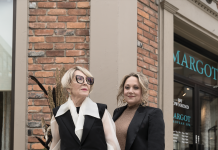
Betsy Brooks, a resident of Ann Arbor, is dealing with an issue that most baby boomers in Michigan are facing: taking care of an aging parent.
Four years ago, Brooks noticed her mother, who was 85, wasn’t participating in the routine activities she used to, such as an arthritis swimming group. After some discussion, Brooks persuaded her mother to move into a single-family home closer to Brooks and her grandchildren.
“She got sick a few years before she moved and was in the hospital and insisting that the neighbors’ children would take care of her,” Brooks says. “(I told her) I don’t think that’s a plan moving forward, and I think she understood. She realized that she would want to be closer to family.”
A couple of years after the move, Brooks spent every day driving to her mother’s new house in the late morning to get her day started and prepare food. Later on, her mother needed more assistance and Brooks would visit twice a day, coming back in the evening to cook dinner.
Brooks is not alone. More than 25 percent of Michigan residents are baby boomers, according to the latest data from the U.S. Census Bureau, meaning a significant percentage of the state’s population is either in the planning stages or is actively involved with taking care of an aging parent or parents.
Brooks finally decided it was necessary to get help for her mother’s care because caregiving required a lot more of her time.
Her mother now has two aides: one through Home Instead Senior Care, which offers in-home care services, and one through a relatively new program called SameAddress, which acts as a concierge service for aging seniors. Brooks’ mother also receives home nursing services through the University of Michigan Health System Michigan Visiting Nurses program.
“A lot has changed (in my life),” Brooks says. “(Taking care of my mother) has pretty much taken up a lot of time and mental space. I just have to deal with everything as it comes up. I don’t know what the day will bring necessarily, but it’s taken over my day-to-day (life).”
A Widespread Practice
Brooks is among an estimated 38.9 million adults in the United States who have provided unpaid care to an adult in 2015, nearly 17 percent of the population, according to a 2015 report called Caregiving in the U.S. published by the National Alliance on Caregiving and the AARP Public Policy Institute.
The report finds 60 percent of caregivers in the U.S. are female and nearly half of caregivers are caring for a parent or parent-in-law. On average, caregivers have been in their role for four years, with a quarter having provided care for five years or more. Caregivers spend an average of more than 24 hours a week providing care to their loved one, with nearly 25 percent providing more than 40 hours of care a week, helping with daily activities such as getting in and out of bed, along with providing transportation, taking them grocery shopping, and helping with housework.
“Caregiving is hard — anyone who’s had children knows it’s not easy,” says Tina Abbate Marzolf, CEO of Area Agency on Aging 1-B in Southfield. “Caregiving can be a 24-hour (a day) job. It really is something that people should not do alone because it’s a very hard job to do for 24 hours, seven days a week, (which you wouldn’t do) in any other job … for some reason when people are caregivers, they think that they need to.”
The Area Agency on Aging 1-B is a nonprofit agency responsible for services to more than 620,000 persons ages 60 and older residing in Livingston, Macomb, Monroe, Oakland, St. Clair, and Washtenaw counties. There is also the Detroit Area Agency on Aging, which serves older residents of Detroit, Hamtramck, Harper Woods, Highland Park, and the five Grosse Pointes; and The Senior Alliance, Area Agency on Aging 1-C, serving southern and western Wayne County.
Marzolf says the most common service her agency offers is through an assistance line, with about 3,000 calls coming in every week from seniors, their caregivers, and families with questions about transportation, inhome health, and availability of funding for long-term care programs, among others. She says the agency also offers services including Meals on Wheels, a home meal delivery program; adult day services, which provides activities and assistance for seniors with physical and mental impairments in a setting outside the home to provide relief for caregivers; and MyRide2, which helps seniors find transportation resources and request a ride, among others.
Marzolf says some in-home care programs are on a waitlist status, prompting the agency to create the service Brooks set up for her mom, the concierge-type program, SameAddress.
“It’s a social enterprise and it’s designed really to help caregivers who are looking for very simple ways or are at least looking for some support to keep their loved ones safe, comfortable, and independent in the home,” Marzolf says.
SameAddress provides up to 40 services including bill paying, house repairs, and medication management — all offered through a single source. Marzolf says SameAddress has received calls from seniors asking for help with other tasks including walking the dog, changing a light bulb on the porch, and doing their hair.
“It gets very old when people call and need help and you’re not able to help,” Marzolf says. “Most people want to stay in their homes and most caregivers want to help their loved ones to do that. So if we can find new and creative ways to do that, that’s really important.”
Brooks says the aide who works with her mother from SameAddress helps with everything from assisting with showers to making dinner, sitting down at the table, and eating with her mother.
“(The aide has) begun doing some housework, some general cleaning, and laundry,” she says. “It’s great. I didn’t think to ask for that kind of help and I would just do it all.”
Taking Care of the Caregiver
Brooks says one of the more difficult aspects she’s noticed about caregiving is that co-workers, friends, and families rarely share the challenging aspects of their experiences.
“Most people tell you how great their mother is, that she’s 99 and still shoveling her own snow,” she says. “It’s like the Christmas letter that you get in (the mail) and the card says how great everybody is.”
She says people need to feel comfortable enough to talk to others about their experiences of being a caregiver.
More than eight out of 10 caregivers say they could use more information on or help with caregiving topics, according to the Caregiving in the U.S. report. Caregiving can even have an effect on caregivers’ health, with nearly 30 percent of higher-hour caregivers (providing more than 20 hours of care a week) reporting caregiving has had a negative impact on their health. Caregivers providing care in more complex situations, such as providing care for a senior with a mental or emotional health issue or providing medical or nursing tasks to a senior, are more likely to report their health has suffered as a result of providing care.
“If you’re a caregiver, it’s not uncommon for you to be put into the role quite quickly in a time of crisis,” Marzolf says. “That’s overwhelming.”
She says the Area Agency on Aging 1-B, in partnership with Alzheimer’s Association — Greater Michigan Chapter, offers a free program for family members who are caring for a person with a dementia-related illness. Called Creating Confident Caregivers, the training program is designed to help caregivers learn better skills for coping, stress management, and dealing with difficult behaviors, Marzolf says. “It offers a small amount of free respite care, so that the loved one can attend the course.”
Other support groups for caregivers are offered at the Bloomfield Township Senior Services center, Henry Ford Medical Center in West Bloomfield, the Chelsea Retirement Community, Crittenton Hospital Medical Center in Rochester Hills, and the Northville Senior Community Center, among others.
Regardless of whether the caregiver takes advantage of support groups, it’s important to know that other caregivers are struggling, too.
“For some people I’m sure (caregiving) isn’t (a hard job), but for some people it’s good to know that this is not rosy and lots of happy memories and times are not being generated right now,” Brooks says.
“It’s a little challenging.”
|
|
|









